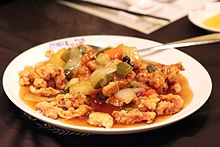Tangsuyuk
 |
|
| Place of origin | Korea |
|---|---|
| Associated national cuisine | Korean Chinese cuisine |
| Serving temperature | Warm |
| Main ingredients | Pork or beef loin, sweet and sour sauce |
| |
|
| Korean name | |
| Hangul | 탕수육 |
|---|---|
| Hanja | (*糖)水肉 |
| Revised Romanization | tangsuyuk |
| McCune–Reischauer | t'angsuyuk |
| IPA | [tʰaŋ.su.juk̚] |
Tangsuyuk (탕수육) is a Korean Chinese meat dish with sweet and sour sauce. It can be made with either pork or beef.
Tangsuyuk was first made by Chinese immigrants in the port city of Incheon, where the majority of ethnic Chinese population in South Korea live. It derived from Shandong-style tángcùròu (糖醋肉), as Chinese immigrants were mostly from Shandong (or other Eastern, Northern, and Northeastern parts of China) due to its geographical proximity to South Korea.
Although The Chinese characters meaning "sugar" (糖), "vinegar" (醋), and "meat" (肉) are pronounced dang, cho, and yuk in Korean, the dish is called tangsuyuk, not dangchoyuk, because the word tangsu derived from the transliteration of Chinese pronunciation tángcù [tʰǎŋ.tsʰû], with the affricate c [tsʰ] in the second syllable weakened into fricative s [s]. The third syllable ròu (肉) was not transliterated, as Sino-Korean word yuk (육; 肉) meaning "meat" was also commonly used in Korean dish names. As the word tangsuyuk was the combination of transliterated loanword tangsu and Sino-Korean yuk, it was not a Sino-Korean vocabulary that could be written in hanja. However, Koreans back-formed the second syllable with hanja su (수; 水), meaning "water", perhaps because the sauce was considered soupy.
...
Wikipedia
